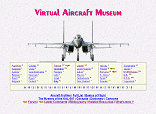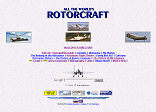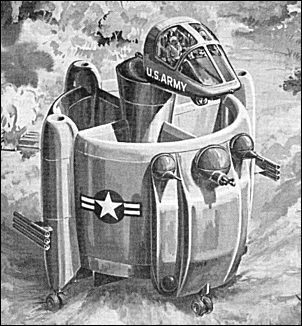|
|
The most unique proposal in the AAFSS competition came from the San Diego division of Convair. The Model 49 did not fit the normal mold for either an airplane or a helicopter, and represented something entirely new. Propulsive power came from turbine engines driving counterrotating propellers within the shroud. Convair believed that the system was inherently more reliable than a conventional helicopter, and pointed out the only pilot control inputs involved directional control and setting rotor blade angle and engine speed. The crew of two occupied an articulating capsule on top of the shroud and was provided with a full array of sensors. The engines, fuel, crew capsule, and avionics bays were equipped with dual-property steel armor for protection against 12.7-mm projectiles.
A wide variety of weapons were proposed for use on the vehicle. The normal complement included two side turrets with either XM-134 7.62-mm machine guns or XM-75 40-mm grenade launchers. Each turret was provided with either 12000 rounds of 7.62-mm ammunition or 500 40-mm grenades. A center turret carried an XM-140 30-mm cannon with 1000 rounds of ammunition. The center turret could also mount 500 WASP rockets, or a second 30-mm cannon. Each of the turrets could rotate and elevate and was capable of being fired while sitting on the ground, in a hover, or during high-speed forward flight. Mechanical stops were provided that prevented any of the weapons from firing at the nose of the crew compartment when it was articulated forward/down. Four hard-points were located on two of the engine nacelles; each could carry a fuel tank, three BGM-71 TOW missiles, or three Shillelagh missiles. Alternately, one of these hardpoints on each nacelle could carry a single M40A1C 106-mm recoilless rifle and 18 rounds of ammunition. The 106-mm cannon had an effective range of 10000 yards, and was effective against hardened targets. All of the hard points could rotate so that they could be oriented into the wind during high-speed flight, or aimed while being fired from either forward flight or a hover. Four external fuel tanks provided up to 1200 gallons additional fuel for ferry flights.
The mission modes for the Model 49 are shown above. The shrouded-rotor vehicle was capable of vertical takeoff and landing, just like a helicopter, and was also capable of hovering. The propulsion system consisted of three shroud-mounted Lycoming LTC4B-11 turboshaft engines, although the General Electric T64, Allison T56, and Pratt & Whitney JFTD12 were also investigated. The engines were coupled through clutches, shafting, and gear-reduction units to contra-rotating variable pitch rotors within the shroud. The thrust and lift systems were extremely interrelated, and the shroud amplified the thrust under some conditions, compensating for the relatively small diameter of the rotors. The engines and gear boxes were located in three of the nacelles along the sides of the shroud; the fourth nacelle contained the weapons and avionics. The overall control system was thought to be similar to conventional helicopters except for the removal of the cyclic pitch feature. Convair planned to leverage the experience gained during the Navy XFY-1 Pogo program in the areas of vertical control systems and powerplant installations, and believed the development risk was minimal. T.Landis & D.R.Jenkins "Lockheed AH-56A Cheyenne", 2000
| Aeroman, e-mail, 12.07.2012 | reply |
So it was just sci-fi. Even a photon powered system is a fine read. | | Matthew Long, 05.12.2008 | reply |
You may also be interested in the Hiller VXT-8 proposal for a single-place coleopter:
On the other hand, the Hiller experience showed that stability in both the hover and forward flight was hard to achieve.
Still, the prone pilot position would seem to be a much better solution and avoid the complex articulated cockpit. It's not hard to imagine modern version as a scout vehicle able to hover even among the tree branches, might be just the thing for urban combat, too. | Best thing for action' computer game I've ever seen. Very impressed. No problems with physic's laws in virtual world, yeah?.. | | <0>, e-mail, 16.07.2008 | reply |
The Last Starfighter, Oh yeah. I remember that movie. Weren't those spacecraft tailsitters just like this? | | Reichardt, King of Germany, e-mail, 12.06.2008 | reply |
AND All of the referenced designs below are directly traceable, or inheritors of the WWII German a /c designs - the 'Fock Wolf Triebfluegel', and the later development of that - the 'Wespe' (NOT the tank destroyer which the Germans also had named Wespe). The latter FW design had a hexagonal shaped shrouded prop - designed for vertical flight - this Convair Design was probably a derivative of the COIN a /c being made - this thing is the definition of GUNSHIP (looks like a GunWing from the old SF movie 'The Last Starfighter', eh?)
HTH, Reichardt, KoG | | cabrol, e-mail, 17.04.2008 | reply |
ok this is just what we have named the COALAB CONCEPT on our site colab concept by GOOGLE. | | <()>, e-mail, 26.02.2008 | reply |
That was probably the Hannon 2C project. It had a rocketship body like you described. It did make it past concept art, though, but not past concept model. | | Stingray, e-mail, 26.11.2007 | reply |
I was just thinking of that aircraft. The French also proposed another project similar to the "Coleoptere", but having a rocketship body and a smaller srouded-rotor system. It never made it past concept art. | | Olaf Bichel, e-mail, 24.09.2007 | reply |
It is a military development of the french SNECMA C.450 "Coleoptere". |
|
| |
|
Do you have any comments ?
|
| 
Virtual Aircraft Museum

All the World's Rotorcraft
|







